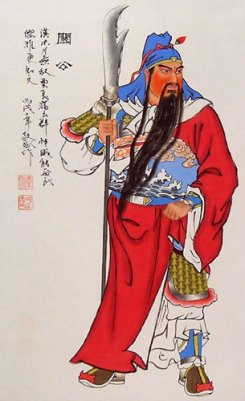Matsu and Guan Di are the two most commonly worshipped deities in Taoist and often Buddhist temples around Taiwan. You can find their figurines, paintings and statues featured in small roadside shrines, in and outside temples and even free standing around cities. Having noticed their regualar appearance within a few days of being in Taiwan, I decided it was important to find out more about these clearly very important deities.
Guan Di

I briefly mentioned Guan Di in my post about The God Of War temple in Tainan. It is easy to get confused when researching or talking to locals about this deity because he can be referred to by three different names. Guan Di is his birth name, Guan Gong means Emperor Guan and Guan Yu means Lord Guan – all of which are acceptable to use.
Guan Di was a general during the late Eastern Han Dynasty. There have been many books written about Guan Di and about the abolishment of the Han Dynasty which features his crucial role in it. He served under the warlord Liu Bei who also wanted to restore the power of the Han Emperor. Liu Bei (who later became the first emperor during what is known as the ‘Three Kingdoms’ period), Guan Di and a fellow comrade Zhang Fei joined forces and bonded by their ideals, became sworn brothers in the ‘Peach Garden’ forming what is known as the ‘Three Brothers’ – a representation of strength and loyalty. Unfortunately many years later, during a battle with the Wu forces Guan Di and his son Guan Ping were captured and executed.
He was later deified as the God of War and is worshipped as this in Taoism, Buddhism, Confucianism and folklore. He is also the God of Literature (only recognised as this in Taoism), the Patron God of Police Officers and the Martial God of Wealth. Unlike what you may expect from a God of War, he was not given this title due to his acts of violence in battle but actually due to his ability and strength to avoid confrontation and violence as much as possible. He is known for making a great affort to minimize violence, conflict and death wherever possible. Guan Di represents integrity, bravery, righteousness and loyalty which is proven in folklore stories of the brotherhood of the ‘Three Brothers’ – this also serves as symbolism for the importance of friendship and loyalty. He became the Patron God of Police Officers because of the reason for his death. When he was captured, before execution he was given the option to join the opposing side. However, he knew this was unloyal, against the law and disrespectful and so he refused, therefore resulting in him being beheadded. Police Officers and the law look at this as a prime example of defending the law and standing for what you believe in, hence his becoming a Patron.
